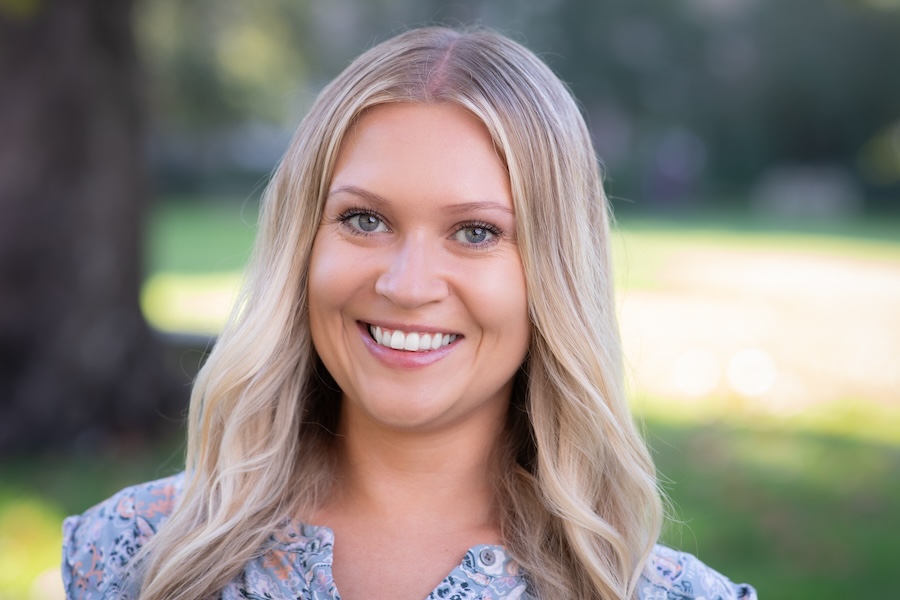Student Spotlight: Sierra Peters

Sierra Peters is a sixth-year doctoral candidate in Florida State University’s Department of Psychology, part of the College of Arts and Sciences. As a student in the Social Psychology program, Peters works in FSU’s Attraction and Close Relationships Lab and the Evolutionary Psychology Lab researching long-term romantic relationships. Peters’ first published paper won a Best Graduate Student Paper Award in 2021, and earlier this year, she earned an Outstanding Teaching Assistant Award, both from FSU.
Tell us a little about your background, where you are from and what brought you to FSU.
I am from a small town near Green Bay, Wisconsin, and I completed my undergraduate studies at St. Norbert College, a liberal arts school in Wisconsin. My senior year of college, I applied to social psychology doctoral programs where faculty members research romantic relationships. I was incredibly lucky to find FSU where three faculty members — including professor Jim McNulty — research relationships, all of whom I have been fortunate enough to work closely with during my time at FSU.
What inspired you to pursue a degree in social psychology?
In high school, I took a college-level psychology class and fell in love with it. When I began studying psychology in college, I planned to pursue marriage and family therapy as a career. I reevaluated these career aspirations around the same time I became involved in research. I was excited by the prospect of asking and answering questions that marriage and family therapists could use to inform their interventions.
Tell us about your research assistantship in FSU’s Attraction and Close Relationships Lab.
In associate professor Andrea Meltzer’s lab, I generate research questions about romantic relationships and design studies to test those questions. For example, we investigate if people’s preferences in romantic partners can predict happiness in their relationships.
I train a team of undergraduate research assistants to help me carry out studies and collect data. I often use existing data from newlywed couples to test my predictions as well. This data is longitudinal, meaning it tracks the same group of people over an extended period of time.
Tell us about your research in the Evolutionary Psychology Lab.
In professor Jon Maner’s lab, I primarily work with my team of undergraduate research assistants designing experimental studies to answer questions related to human mating through the lens of evolutionary psychology. For example, does increasing sexual desire toward one’s current romantic partner increase sexual desire for alternative partners, too? We design experiments and use implicit measures of cognition to conduct research.
What does earning a 2024 Outstanding Teaching Assistant Award mean to you?
OTAA involves an intensive selection process, and I am overwhelmed with gratitude for my students who nominated me, mentors who provided letters of support, and everyone who shaped me into the instructor I am today. Being recognized for instructional excellence affirms that teaching is the right path for me. One of the most rewarding aspects of teaching is hearing how students continue to apply class concepts in their own lives months — or even years — after our class ended.
Tell me about your paper, “Newlywed Couples' Own and Partner Sexual Disgust Sensitivities Interact to Predict Their Marital Satisfaction Through Their Sexual Satisfaction,” which earned a Best Graduate Student Paper Award in 2021.
In this paper, we were interested in whether an evolved trait called sexual disgust sensitivity — the tendency to be unnerved by behaviors of sexual partners’ that do not align with one’s own preferences and norms — affects sexual satisfaction. We used data from a two-year longitudinal study of 102 newlywed couples to examine whether people and/or their partners’ sexual disgust sensitivity were associated with their sexual and marital satisfaction.
We found that people and their partners whose levels of sexual disgust sensitivity were relatively similar maintained higher levels of sexual satisfaction across the first two years of marriage, which was associated with similarly elevated marital satisfaction. Our findings suggest people with high sexual disgust sensitivity may benefit from choosing partners with similarly high sexual disgust sensitivity.
Tell us about serving as the graduate student adviser for FSU’s Psychology Club.
I frequently host talks, workshops, and panel discussions in addition to connecting students with opportunities in the field. I really enjoy this unique opportunity to mentor students beyond the classroom and the research lab.
What aspects of your research do you find most rewarding?
The two most rewarding aspects are discovering answers to important questions and mentoring students. I derive a lot of pride from watching my students’ curiosity spark, their research skills develop, and their eyes light up when they realize they have contributed to something meaningful.
It is a great privilege to study a phenomenon that is so integral to nearly every human being’s life on earth: intimate relationships. The opportunity to ask important questions, design studies, and analyze the data to illuminate the answers has always energized me.
Even though you might miss FSU, what are you looking forward to once you graduate?
I will miss FSU very much — particularly my fellow graduate students who have become lifelong friends and incredible mentors. Nevertheless, I am ecstatic to continue my journey in academia by becoming a faculty member at a university or college.
What advice do you have for fellow students? What advice do you have for undergraduate students?
My advice for fellow graduate students is to find a healthy work-life balance. Graduate school is an intense, demanding journey that requires significant time and effort. I recommend finding a schedule that works for your lifestyle and making time for self-care and hobbies you enjoy.
My advice for undergraduate students, especially those interested in graduate school, is to start gaining experience in the field and getting involved in research as soon as you can. Not only will this help you narrow down your interests, but experience will also help make you a competitive graduate school applicant.
